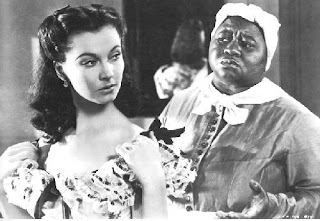
Momma, mammy--so different, so alike, so much of who I am. Lots of mmmm's, lots of giving, lots of love. But however much they appear the same, the conditions that create them are very different, and that difference is why it is crucial to me to embrace the momma and free the mammy.
I remember watching old movies with my grandmother and seeing black women with head scarves clucking and catering to the likes of everyone from Mae West to Vivian Leigh (pictured). I later saw the movie "Imitation of Life" and was both ashamed of and inspired by the love and care shown by the character Annie (Did she have a last name?). I was also intrigued by the nowhere land she dwelled, alone and unloved, even by her own daughter. All those women were anonymous except to the regard they loved and nurtured without being truly included in their "families." They also shared another characteristic, their continued survival (economic as well as emotional) required them to be "loving" and "supportive." Such is the lot of the mammy.
Momma, of course, comes from a very different place. She is multidimensional and is part of the "family." Most important her love comes from a place a freedom and not necessity for economic, social, or spiritual survival. She is aware of her beauty and strength not from her care of others. It is the reverse, her love and care is a projection of her own heart. I grew up with women who at their hearts were mommas, but society both white and black needed them to be mammies.
Mammy is a caricature, and her historical existence is not from the chattel slavery south, but from the period of "Emancipation." (See http://www.ferris.edu/jimcrow/mammies/) She is a utility.
I've experienced the desire to use women, particularly black women as "workers" for the church and mosque. But it is not just religious settings that call me to sit on the mammy throne. Replace "Scarlett" with any and all institutions, including family. So often it seems that only the mammy is wanted. After all, she's asexual, without needs, without boundaries, without desires except those she is called upon to fill. She's overweight and unkempt, self-care is, of course, selfish and must be avoided at all costs.
How do I free this person and awaken her to her own self? It seems I must embrace her and recognize and honor her humanity, even while the world views her (and she views herself) as a tool. She's not. She loves even knowing that those she loves may join the chorus of negation that bombards her. I will model loving that doesn't require self-immolation.

Greetings Ayesha,
ReplyDeleteSTANDING OVATION!
In particular: “How do I free this person and awaken her to her own self? It seems I must embrace her and recognize and honor her humanity, even while the world views her (and she views herself) as a tool. She's not.”
My apologies in advance if I’m long winded but I was just reflecting on this issue today.
From: What Moves At The Margin by Toni Morrison-Rootedness The Ancestor As Foundation pages 61-64.
I have talked about function in the other question, and I touched a little hit on some of the other characteristics (or distinctive elements of African-American writing, one of which was oral quality and the participation of the reader and the chorus. The only thing that I would add for this question is the presence of an ancestor; it seems to me interesting to evaluate Black literature on what the writer does with the presence of an ancestor. Which is to say a grandfather as in Ralph Ellison or a grandmother as in Toni Cade Bambara, or a healer as in Bambara of Henry Dumas. There is always an elder there. And these ancestors are not just parents, they are sort of timeless people whose relationships to the characters are benevolent, instructive, and protective and they provide a certain kind of wisdom. How the Black writer responds tot hat presence interests me. Some of them such a Richard Wright had a great difficulty with that ancestor. Some of them, like Hams Baldwin, were confounded and disturbed by the presence or absence of an ancestor. What struck me in looking at some contemporary fiction was that whether the novel took place in the city of in the country, the presence or absence of that figure determined the success or the happiness of the character. It was the absence of the ancestor that was frightening and threatening and it caused huge destruction and disarray in the work itself. That the solace comes, not from the contemplation of the serene nature as in a lot of mainstream white literature, nor from the regard in which the city was held as a kind of corrupt place to be. Whether the character was in Harlem or Arkansas, the point was there, this timelessness was there, and this person represented this ancestor. And it seemed to be one of those interesting aspects of the continuum in black or African American art, as well as some of the things I mentioned before: the deliberate effort, on the part of the artist, to get a visceral, emotional response as well as intellectual response as he or she communicates with the audience.